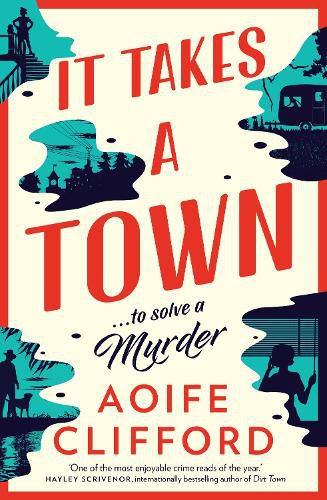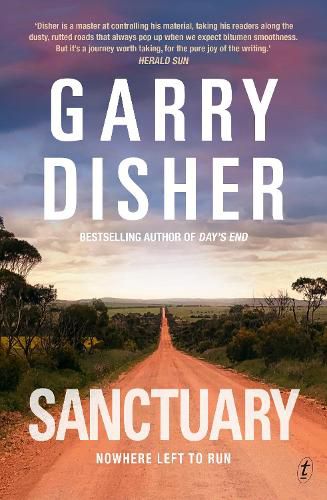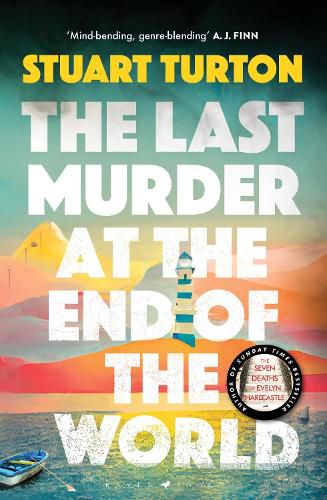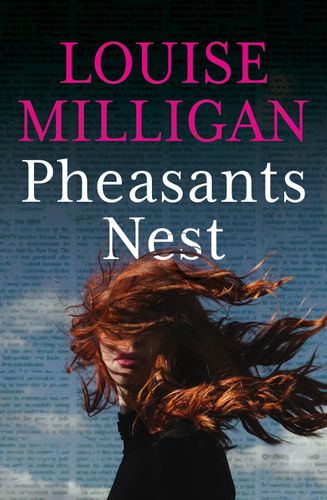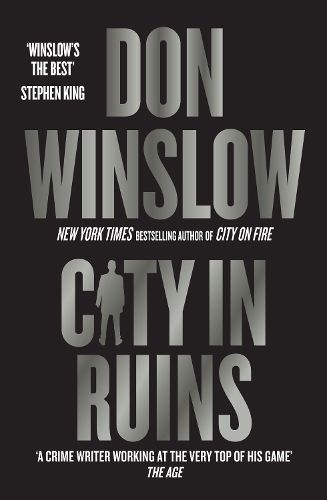These are the crime books which have been read and reviewed by our excellent booksellers this month – all in one place!
It Takes a Town by Aoife Clifford
Reviewed by Aurelia Orr from Readings Kids
Reading this book, I’m reminded of a quote in F. Scott Fitzgerald’s The Great Gatsby, when Jordan says ‘And I like large parties. They’re so intimate. At small parties there isn’t any privacy.’
Set in the Australian countryside in the small town of Welcome, all anyone can talk about is how Vanessa Walton, the glamorous celebrity and town’s golden child, was found dead at the bottom of her staircase. Everybody says it was a tragic accident. But when 16-year-old Jasmine Langridge, the step-daughter of Barton Langridge, the town’s local MP, finds a threatening note in Vanessa’s handbag, and claims publicly that Vanessa’s death was a murder, she suddenly disappears. With tensions rising, the community of Welcome has never been more scared, nor more distrusting.
When you live in a place where everybody knows everyone, how long can trust for one’s neighbour last when conflict arises? Growing up and living near the Melbourne CBD my whole life, I’ve never felt that fear of isolation or scrutiny from a community because the city life means a life of privacy and anonymity. However, during the covid pandemic, when no one knew what was happening or what our futures would look like, I caught a glimpse of how reliant any community, big or small, is on the unspoken rules and expectations that hold it together for peace, civility, and harmony. But when panic and tragedy, even violence, arises, these structures and shared assumptions can crumble, leaving us to fend for ourselves. The citizens of Welcome must solve Vanessa’s murder and Jasmine’s disappearance together, as a fractured community, even if that means working side-by-side with the killer.
Perfect for fans of Agatha Christie, Kerry Greenwood, and Richard Osman, It Takes a Town is among the classics, asking us how much we really know those we thought we could trust the most.
Sanctuary by Garry Disher
Reviewed by Kate McIntosh, manager of Readings Emporium
Most of us lead law abiding lives. Sure, there’s the occasional speeding fine, or you went slightly outside the 5k limit during lockdown, or pinched a packet of lifesavers when you were a kid, but at the end of the day, you’re a good citizen and have never been on the run. Hopefully, you’ll never need to be looking over your shoulder, unable to settle in one place for long, always moving on, wary of strangers and constantly changing your appearance, just in case. Unlike most of us, Grace has been running for years. A professional thief, forced into a life of crime by a crooked cop at a young age, she has learnt to lie, steal, and flee. It’s all she knows. It’s also lonely as hell.
After a close call with someone from her past, Grace runs again, determined this time to find somewhere she can stay, a place she can call home and live a ‘normal’ life. In a small South Australian town near the Adelaide Hills, she thinks she’s finally found sanctuary. Here, she has a respectable job she enjoys, a safe place to sleep, and maybe even a friend. Little does she know that her past is on its way to catch up with her, and that her new friend is in danger, too. The kind of danger that brings men with guns to your doorstep.
If you’ve never read a book by Garry Disher before, this standalone novel is an excellent place to start. If you are already a Disher fan, you will know to expect a rollercoaster of a read, full of disturbing crimes and unscrupulous crooks. Except Grace, of course, she’s the kind of criminal you’ll find yourself barracking for in the end, hoping she finds her place of refuge, safe from persecution, and prosecution.
The Last Murder at the End of the World by Stuart Turton
Reviewed by Alexandra Gleihs from Readings State Library Victoria
Welcome to Blackheath – the last island of human inhabitants at the end of the world. After a cataclysmic event exterminates the rest of the planet and it is enshrouded by a deathly black fog, one tiny island holds the last of humanity: 122 villagers and three scientists. They are kept safe by an extremely sophisticated security system that also exists in their minds. All is well. All are happy. Until one of them is brutally murdered and all in the village realise the last 24 hours of their memories have been erased. A ticking clock hanging over the residents turns this thriller on its head.
I love a good mystery novel that puts more than the usual twist on things, and this one is no exception. Stuart Turton weaves an incredibly compelling narrative that draws you in before you’ve even realised it. The world-building alone is brilliant and believable, and with each character you’re left wondering whodunit – and whydunit?
This book is fairly unusual in that it’s narrated by an omniscient A.I. named Abi. At first it was tricky latching on to Abi’s ‘voice’, but once grasped they became a fascinating storyteller that carries you through, along with Emory, a fierce and wilful villager tasked with solving the murder, who I just adored as she never stops questioning everything.
The Last Murder at the End of the World is a suspenseful blend of a murder mystery and post-apocalyptic science fiction, all wrapped up into a single book. If you enjoyed Turton’s first book, The Seven Deaths of Evelyn Hardcastle, and authors such as Max Barry and Benjamin Stevenson, this novel will not disappoint.
Pheasants Nest by Louise Milligan
Reviewed by Chris Gordon, events and programming manager
Should a story, which begins in a suburb you know well, which involves sexual assault, and ends in the middle of nowhere, come with a warning even if there is a love story in it? I think so. Here is the warning: Pheasants Nest is a terrifying read – compelling, but frightening. It is a story centred on an act of violence.
This is award-winning investigative reporter and nonfiction author Louise Milligan’s first foray into fiction, and it is a blockbuster of a story. (Surely, it will end up as a television series or film.) It is the story of every woman’s nightmare. Kate Delaney, a journalist, is out with her girlfriends in Northcote. On her way home, she is raped and kidnapped by a random man she ridiculed. She is driven across the state to the middle of NSW. Kate, like Milligan, knows the statistics about what happens to women who find themselves in these situations. She understands how the police and the media work. She knows the chances of this crime being solved are slim. She knows that the police will question her boyfriend, Liam, and that he will remain a suspect.
We meet in parks to hold vigils, we hold our keys as a weapon, and message one another when we get home because of these cases. I believe Milligan has written this novel to illustrate to us all how each part of the public story is ours. It is possible your thoughts will wander to cases in the press right now, or to stories that do not get published, or even to memories of past cases and women not found. Stories like this that are set in familiar surrounds are important because they remind us to look after one another, to come forward with our truths, and to be optimistic for change. Louise Milligan has written a superb and disturbing page-turner. I could not put it down until I reached the end.
City in Ruins by Don Winslow
Reviewed by Pierre Sutcliffe from Readings St Kilda
For the last 30 years, Don Winslow, one of the most interesting and creative American crime writers, has made the purchase of his latest book a very reliable and easy choice for readers. He has published a number of series, The Cartel trilogy being the most successful. He rarely followed a book with a sequel, it was always a pleasant surprise to find out what the next book was, and each book was better than the last. Savages and The Death and Life of Bobby Z were both made into films. In 2020, he published Broken, a collection of six novellas/short stories that was hilarious, violent and profane. Within it, he paid homage to writers such as Elmore Leonard in a very sincere and flattering fashion.
Ten years ago, Winslow became an outspoken activist and opponent of all Trumpian forces. He announced that after the release of the final book in the City series, City in Ruins, he would be retiring from writing and spending the rest of his days fighting Trump and his goons.
City on Fire began the Cities trilogy about Danny Ryan. It was set in Rhode Island in the ’80s and ’90s, and a woman emerging from the waves à la Helen of Troy set the Irish and Italian mobs to war, and so this intergenerational saga began. City of Dreams then followed Danny Ryan to Hollywood and the film industry. And this month we’ll have City in Ruins: the final chapter in the Danny Ryan trilogy and of Winslow’s writing career. The book itself was unavailable at press time, but I think Winslow deserves a valedictory salute. If you liked The Godfather, Get Shorty, The Friends of Eddie Coyle or Mystic River, I strongly recommend you start your Don Winslow reading journey with City on Fire and then explore his backlist.


